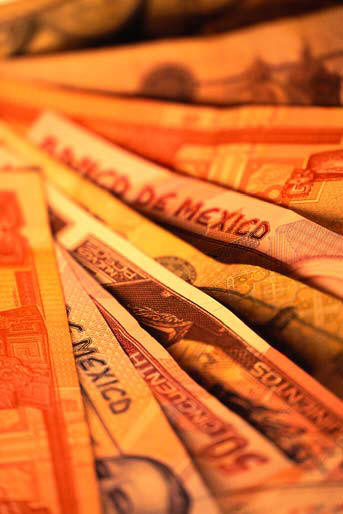Argentina can send a current account deficit for the first time in a decade next year, raising concerns that the peso will weaken further and become the worst performing currency in Latin America for the third consecutive year.
The deficit is likely to be equal to 0.4 percent of gross domestic product in 2011. The weight can be slid 8 percent to 4.29 per dollar at the end of next year.
Argentina may report its first current account deficit since 2001, imports exceed exports. The measure of trade in goods, services and investments will probably be reduced by 73 percent in the third quarter last year to $ 1 billion. A weaker peso could erode the dollar return in local currency bonds after obtaining 16 percent in 2010, compared with 15.3 percent for Brazil's debt and 8.7 percent for Notes from Russia.
"For an investor holding a role in weakening peso is important to take away from their statements," said Alejandro Urbina, manager of emerging market debt Silva Capital Management in Chicago, in a telephone interview. "Beyond the 4.25 per dollar, I start to look different local investment. But that's my high estimate for things to go."
Urbina, whose holdings include bonds in Argentine pesos, said he believes that the government allowed the peso to weaken to 8 percent. Silva has about $ 800 million under management and advice.
Fernández Strategy
The government of the publication of current account data at 2 pm, New York and the trade balance data on 22 December. The trade balance likely fell in November to $ 881,000,000 from $ 1.2 billion a year earlier.
President Cristina Fernandez de Kirchner will seek a weaker peso next year to curb rising imports, boost exports and avoid a current account deficit, said Juan Pablo Fuentes, Latin America economist at Moody's Analytics Inc. in West Chester, Pennsylvania .
"That will be the best way to prevent the current account deficit falling," he said. "That slows down imports, promoting exports and domestic production support."
Weight may drop as much as 12 per cent to 4.50 per dollar in 2011 when the government fails to slide, Fuentes said in a telephone interview.
Credit Default Swaps
The currency rose 0.1 percent last week to 3.9742 per dollar and has fallen 4.4 percent in 2010.
The extra yield investors demand to hold government bonds in dollars rather than U.S. Treasuries rose 18 basis points to 533 on December 17, according to JPMorgan Chase & Co.
The cost of insuring Argentine bonds against default for five years fell 11 basis points to 637, according to CMA DataVision. Swaps credit-default pay the buyer face value in exchange for the underlying securities or the cash equivalent of a government or a company fails to meet debt agreements.
Consumer prices
Standard & Poor's upgraded the foreign currency ratings of eight companies in Argentina on 17 December after a review of the business environment in Argentina. Alto Palermo SA, Latin American company Infrastructure and Services SA, IRSA Inversiones y Representaciones SA, Telefonica de Argentina SA, Transportadora de Gas del Sur SA and Telecom Personal SA were raised to B. Loma Negra Ciasa was raised to B + and BB-Petrobras Argentina SA, the company said in a statement.
Argentina drop weight can slow next year to curb rising consumer prices that Goldman Sachs Group Inc. estimates above 25 percent, said Jorge Todesca, a former deputy economy minister who now heads the investigation of Buenos Aires Finsoport company.
"The exchange rate is the only anchor the government against inflation," Todesca said in a telephone interview in Buenos Aires. Weight is expected to slide in line with the target of 4.10 per dollar in 2011 Fernández budget.
"Lax" fiscal and monetary policy is driving domestic consumption, together with inflation, is driving demand for imports, said Bertrand Delgado, an economist at Roubini Global Economics LLC in New York.
The government said spending last month rose 52.7 percent in annual terms in October. The central bank raised its money supply growth target in August after beating its original target.
Reserve Construction
Argentina policy makers try to accumulate reserves, while the peso weakened to shore up margins of exporters' profit, a strategy for Fernandez defended in a speech of 07 December in Buenos Aires.
"Without government intervention, the peso would be worth about 1.86 per dollar, he said.
Import demand will rise even more next year the Government to increase spending and central bank maintains an expansionary monetary policy before the October presidential elections, said Delgado.
"There will be some contraction or a contraction in progress, the current account surplus," said Delgado. "It will have an impact on weight."



0 comments:
Post a Comment